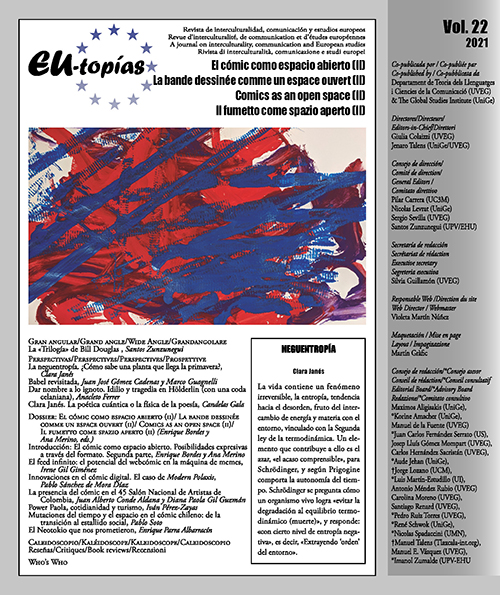Naming the unknown. Idyll and tragedy in Hölderlin (with a Celanian coda)
DOI:
https://doi.org/10.7203/eutopias.22.22925Keywords:
Tragedy, idyll, Hölderlin, Celan. Abstract
Abstract
On June 4th, 1799, in a letter to Neuffer, Hölderlin cites for the first time the name of a play he claims to have «finished except for the last act». It is to be called «The Death of Empedocles». He intends to publish it in the first issues of a monthly poetic magazine «for ladies» which he plans to be the editor of if he succeeds in envolving the publisher Johann Friedrich Steinkopf in the project. It will be called Iduna. Of the works associated with the Iduna plan, only fragments and the finished text that Steinkopf commissioned him to write about Emilia will survive. The writing of Empedocles and Emilia coincide in time, one a poetically grounded tragedy, the other a sentimental idyll only apparently of circumstance. Through both texts, developed in a time of marked political instability, the poet answers (or at least tries to) his own question: Why poets in times of need? This is a question that Paul Celan will also face a century and a half later.
 Downloads
Downloads
 References
References
Hölderlin
Hölderlin, F. Hiperión o el eremita en Grecia. Madrid: Hiperión, 1976.
Hölderlin, F. Ensayos. Madrid: Hiperión, 1976.
Hölderlin, F. Hiperión. Versiones previas (HVP). Madrid: Hiperión, 1989.
Hölderlin, F. Correspondencia completa (HCC). Madrid: Hiperión, 1990.
Hölderlin, F. Sämtliche Werke und Briefe (SWB). Múnich: Carl Hanser Verlag, 1992 ss.
Hölderlin, F. Empédocles. Madrid: Hiperión, 1997.
Hölderlin, F. Odas. Madrid: Hiperión, 1999.
Hölderlin, F. Emilia en vísperas de su boda. Madrid: Hiperión, 1999.
Celan
Celan, P. Obras completas. Madrid: Trotta, 1999.
Celan, P. y Sachs, N. Correspondencia. Madrid: Trotta, 2007.
Celan, P. Microlitos. Aforismos y textos en prosa. Madrid: Trotta, 2015.
Secundarias
Alleman, B. Hölderlin y Heidegger. Buenos Aires: Los libros del mirasol, 1965.
Arrighi, P. y Pomponi. F. Histoire de la Corse. París: Presses Universitaires de France, 1993.
Bertaux, P. Hölderlin y la Revolución Francesa. Barcelona: Ediciones del Serbal, 1992.
Constantine, D. Friedrich Hölderlin. Múnich: Verlag C.H. Beck,1992.
Courtine, J-F. «Qui est l’Empédocle de Hölderlin?». Nietzsche, Hölderlin et La Grèce. É. Gaède (ed.). Niza: Publicacions de la Faculté des Lettres et Sciences Humaines de Nice, 1985, Nº 34 (1re Série).
Gaier, U. Hölderlin. Eine Einführung. Tubinga: Francke Verlag, 1993.
Grätz, K. «Der Übergang vom Alten zum Neuen. Hölderlins Geschichtsauffassung in seiner Tragödie ‘Der Tod des Empedokles’». Text+Kritik, VII, 1996, 99-117.
Gutiérrez Girardot, R. «Prólogo», Fiesta de la paz. Friedrich Hölderlin. Bogotá: Áncora Editores, 1994.
Hock, E. «Zu Hölderlins Reise nach Kassel und Driburg». Hölderlin-Jahrbuch, 16, 1969-70, 254-290.
Jamme, Ch. (1983): «Liebe, Schicksal und Tragik. Hegels ‘Geist des Christentums’ und Hölderlins ‘Empedockles’». «Frankfurt aber ist der Nabel dieser Erde». Das Schicksal einer Generation der Goethezeit. Ch. Jamme y O. Pöggeler. Stuttgart: Klett-Cotta, 1983.
Knaupp, M. «Prólogo». Empédocles. Friedrich Hölderlin. Madrid: Hiperión, 1997.
Laercio, D. Vidas de filósofos ilustres. Barcelona: Iberia, II, 1986.
Ludwig, E. Napoleón. Barcelona: Editorial Juventud, 1956.
Prignitz, Ch. Hölderlins «Empedokles». Die Vision einer erneuerten Gesellschaft und ihre zeitgeschichtlichen Hintergründe. Hamburgo: Helmut Buske Verlag, 1985.
Ryan, L. «‘Hier oben ist ein neues Vaterland’. Hölderlins Trauerspiel ‘Der Tod des Empedokle». Bad Homburger Hölderlin-Vorträge, 1985, 33-48.
Safranski, R. Hölderlin o El fuego divino de la poesía. Barcelona: Tusquets, 2021.
Szondi, P. «Lectura de ‘Strette’». Estudios sobre Celan. Madrid: Trotta, 2005.
Schiller, F. Sobre la gracia y la dignidad. Sobre poesía ingenua y poesía sentimental. Barcelona: Icaria, 1985.
Sófocles. Tragedias completas. Madrid: Cátedra, 1990.
Szondi, P. Estudios sobre Hölderlin. Barcelona: Destino, 1992.
Zamacois, J. Curso de formas musicales. EE.UU: SpanPress Universitaria, 1997.
Downloads
Published
How to Cite
-
Abstract258
-
PDF (Español)178
Issue
Section
License
![]()
The authors conserve the copyright. All content published in EU-topías. Journal of interculturality, Communication, and European Studies are subject to the license Creative Commons Attribution-NonCommercial-ShareAlike 4.0 license. The full text of the license can be found at <http://creativecommons.org/licenses/by-nc-sa/4.0>
They may be copied, used, disseminated, transmitted and publicly displayed, provided that:
- The authorship and original source of the publication is cited (journal, publisher and URL of the work).
- They are not used for commercial purposes.
- The existence and specifications of this license of use are mentioned.
It is the responsibility of the authors to obtain the necessary permissions for images that are subject to copyright.



